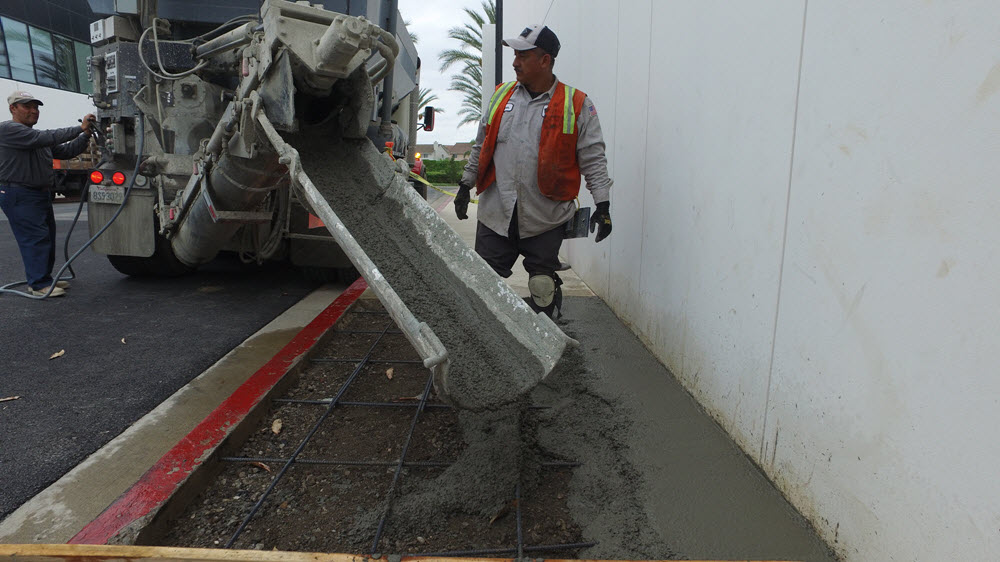The optimal thickness for a general use concrete sidewalk is four inches.
The purpose of your sidewalk is the main determining factor of the thickness you need. Typical sidewalks provide a smooth solid surface for foot traffic and light-weight wheel traffic like bicycles and hand carts. When properly cured, a four-inch thick concrete sidewalk provides the sturdy surface needed for this traffic. If your sidewalk supports motorized vehicles or crosses a driveway, additional depth will be required. A sidewalk to support motorized vehicles may be up to 8 inches thick.

(Photo taken before the Safer-At-Home mandate.)
Creating a Long Lasting Sidewalk
The thickness of your concrete sidewalk is one important element in the appearance and endurance of your sidewalk. Proper installation is essential for the professional appearance and long-lasting durability you need for any sidewalk. A properly installed sidewalk should meet your needs without the addition of extras that will increase the cost of your project.
Do Sidewalks Need Rebar?
Most sidewalks don't need to be reinforced with rebar.
Rebar is a steel bar used to reinforce the strength of concrete used to withstand heavy weight. The name comes from the term reinforcement bar and is typically used in thicker concrete sidewalks expected to support heavy trucks or machinery. Rebar might also be used in sidewalks required to withstand impact on a regular basis.
General use sidewalks don't benefit from the addition of rebar. In fact, using rebar in your sidewalk could actually cost you more over time if your sidewalk needs repairs. A typical sidewalk repair is completed by removing and replacing the damaged area. A reinforced sidewalk can complicate repairs.
How Expansion Joints Work
Expansion joints are the occasional lines you see in a sidewalk that look like cracks. These joints aren't technically cracks because they don't extend through the entire thickness of the sidewalk, and they have an important purpose.
Concrete expands and contracts due to changing temperatures and moisture levels. These changes can cause your concrete sidewalk to crack, ruining its smooth appearance and increasing the potential for trips and falls. Joints in the sidewalk help prevent early sidewalk damage from random cracks. Sidewalk joints don't technically prevent cracks. They simply allow the concrete to crack where joints already exist.
There are two types of joints commonly placed in concrete sidewalks.
- Control joints: These are the lines you see placed periodically in most sidewalks. The depth of a control joint is about a quarter of the thickness of your sidewalk (1 inch deep for a four-inch-thick sidewalk). These joints are placed 8-12 feet apart in a four-inch-thick sidewalk and can be created during the pouring process or cut into the sidewalk once the slab has cured enough to prevent chipping.
- Expansion joints: These joints are the lines that occur when a sidewalk meets another material. For instance, a sidewalk that meets a building, or joins another sidewalk, requires expansion joints. This type of joint goes through the entire depth of the sidewalk and is used to avoid stress where concrete abuts. Expansion joints are placed before the concrete is poured.
Sealing Your Sidewalk Can Increase Its Lifespan
Sealing your sidewalk helps prevent stains that build up over time and helps it resist wear from continual weather exposure. Your sidewalk should be sealed soon after it is poured and sealant should be reapplied every few years as needed.
Concrete technically continues to harden for years after pouring, but the initial cure takes around a month. At this time, your sidewalk is ready to be sealed. Your paving company may test your concrete for moisture content before applying a sealer and wait for the optimal time to seal your sidewalk.
Professional Sidewalk Installation Basics
If you're having a sidewalk installed in a commercial setting, you want to know exactly what to expect. While every project is different, you can expect a professional paving contractor to provide a description of services so you can be prepared. Certain aspects of every concrete sidewalk installation are similar. Here's what you can expect.
- Old Sidewalk Removal: If your old sidewalk is too damaged to be repaired, your paving contractor will have the tools to remove and recycle the damaged sidewalk. The cost of removal will depend on the size of your existing sidewalk.
- Determining the Cost: There are many factors that go into the cost of installing a concrete sidewalk. Size will likely be the most important factor since your contractor will provide approximate price quotes based on the square footage or yardage of your sidewalk. Other factors include the amount of prep work you need, special details like stamping, and whether you have an existing sidewalk to remove.
- Installation Process Time: No matter what size your new sidewalk will be, you can expect the installation process to take a significant amount of time. If significant preparation is required, your team might remove your old sidewalk and prep the area the day before pouring begins. Most sidewalk projects can be completed in 1-3 days. However, finishing work like sealants may be applied several days or weeks later.
- Using Your New Sidewalk: Your new sidewalk takes about 28 days to fully cure, but you don't have to wait that long to use it. For the first 24 hours, you should avoid disturbing your new sidewalk. Walking on the sidewalk is okay after 24 hours, but it can still be scuffed easily. Take care not to drag objects, apply heavy weight, or gouge the new concrete for the first few days. Normal foot traffic can resume after 3 days but you should wait 7 days to drive on new concrete.
A concrete sidewalk is an investment that will last many years to come if it is properly installed. If your personal or commercial property needs a new sidewalk, Empire Parking Lot Services can provide you with beautiful, professional, results. Contact us at 714-633-0300 to have our experienced team assist you with your next concrete related project. Our team is passionate about customer satisfaction and determined to delight you with the best service, workmanship, and materials the industry has to offer. Please check out our "Anatomy of a Parking Lot" blog for a more in-depth view of what makes up a parking lot.
Other Concrete Related Blogs:




Comments